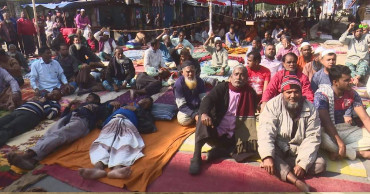wages
Tea workers' wages raised to Tk170 a day after meeting with PM
The daily wages for the tea estate workers have been raised to Tk 170 from Tk 120, a senior official said on Saturday night.
Apart from this, the other facilities for the workers will be increased proportionately.
Prime Minister’s Principal Secretary Ahmad Kaikaus announced it after a meeting with the tea garden owners.
Prime Minister Sheikh Hasina chaired the meeting held at her official residence Ganabhaban.
Tea Garden Owners’ Association president Shah Alam led the owners' delegation at the meeting.
Kaikaus said the daily wages for the tea garden workers have been set by the prime minister on behalf of the workers.
She also requested the workers to go back to work in their plantations, he added.
Earlier, in the meeting, the prime minister said Father of the Nation Bangabandhu Sheikh Mujibur Rahman took over as the chairman of the Tea Board in 1957 and granted citizenship to these workers who did not have any citizenship.
He also gave some other facilities to the tea garden workers, she said.
She said during her 1996-2001 term she gave some other facilities considering the importance of the tea industry.
She also said the AL government took initiatives to expand the tea gardens from Sylhet and Chattogram to other places in the country including Panchagarh, Kurigram, Thakurgaon and Lalmonirhat.
“They (tea workers) work very hard and the owners earn. It is the responsibility of all to look after their wellbeing,” she said.
She said due to the coronavirus pandemic all are affected, but these people who work very hard, have to be taken care of properly.
Weeks ago, the workers at the country's 167 tea plantations went on a strike to press for increasing their daily pay to Tk300, given the recent price hike of the essential commodities
Read: Who are the tea workers? A brief profile
Kaikaus said that in the tea industry the workers get a number of other facilities which are borne by the owners.
He mentioned that due to the enhancement of the daily wages the plucking bonus and factory right work income will be increased proportionately.
He also mentioned that the annual leave allowance and festival allowance will also go up proportionately.
He said that the contributions of the employers to the workers’ provident fund and the annual festival bonus as per the presence at will be enhanced.
He also mentioned that the owners give to workers food ration at Tk 2 per head against the procurement cost of Tk 28 per packet.
He said that the PM will soon hold a video conference with the tea estate workers to know in details their working and living condition.
3 years ago
Tea garden workers: Can their wages ever be realistic?
Tucked away in another world beyond social and media scrutiny, the life of tea garden workers is basically terrible. This has been proven by much research but the situation has not changed. In fact chances of changing are low. The sector is based on poor wages. This has several reasons behind it. And not all are economic.
One fact that is being missed is that any appeal to the government means appealing to an owner. The government owns and operates several gardens and reports suggest the conditions of the workers are the worst in those. So how sympathetic or fair the GOB can be can be guessed.
The reality is that tea-garden workers are experiencing economic segregation akin to racism which is common in any so-called nation state. Only the majority has full rights in all the South Asian societies. The tea garden workers are decidedly from a different ethnic background. When a ruling class claims its entire identity is based on ethnicity-Bengali- the chances other ethnic groups will also have equal rights is not realistic.
Read: Tea workers call off strike, return to work with previous wage of Tk 120
Functional slavery?
According to a study conducted by Shahjalal University on behalf ILO in 2016, the main reason why tea garden workers do join the garden is due to lack of options.
· It said that the majority of the workers decided to work in the gardens due to ancestral connections. Others said they had no other alternatives. ( 63.2%)
· Any tea plantation worker who does not work in the gardens or is not registered as permanent workers is not permitted to possess or live in the labour line . As the workers don’t have land , inside or outside the garden they have no choice but to work in the garden.
· Recruitment process is informal and 93% of workers are under informal contract.
The reason why these people have no choice of employment is because they have no education or skills and no one wants to give it to them. If they do, such a denied population stuck to the gardens without any choice will depart and the tea sector will be hurt if not collapse. So the facts are obvious that no significant improvements in the conditions of the workers will happen as that will go against the interest of the owners which includes the government.
The government as the main buyer and seller also makes more profit than others so the wisdom of appealing to the government who are a beneficiary of the dismal condition doesn’t make much logic.
It’s important to set up a Tea Workers’ Wages and Benefits commission to identify what can be done. But who will do it ? One is however concerned that the sector may have been making profit by sustaining the current conditions and any fair wages will be resisted by all as it is not “feasible” in a chronically inefficient economic system.
3 years ago
3 US-based economists win Nobel for research on wages, jobs
A U.S.-based economist won the Nobel prize in economics Monday for pioneering research that transformed widely held ideas about the labor force, showing how an increase in the minimum wage doesn’t hinder hiring and immigrants don't lower pay for native-born workers. Two others shared the award for developing ways to study these types of societal issues.
Canadian-born David Card of the University of California, Berkeley, was awarded half of the prize for his research on how the minimum wage, immigration and education affect the labor market.
The other half was shared by Joshua Angrist of the Massachusetts Institute of Technology and Dutch-born Guido Imbens of Stanford University for their framework for studying issues that can't rely on traditional scientific methods.
The Royal Swedish Academy of Sciences said the three “completely reshaped empirical work in the economic sciences.”
Together, they helped rapidly expand the use of “natural experiments,” or studies based on observing real-world data. Such research made economics more applicable to everyday life, provided policymakers with actual evidence on the outcomes of policies, and in time spawned a more popular approach to economics epitomized by the blockbuster bestseller “Freakonomics,” by Stephen Dubner and Steven Levitt.
Read: Russian Nobel winner: Peace Prize is for my paper, not me
In a study published in 1993, Card looked at what happened to jobs at Burger King, KFC, Wendy's and Roy Rogers when New Jersey raised its minimum wage from $4.25 to $5.05, using restaurants in bordering eastern Pennsylvania as the control — or comparison — group. Contrary to previous studies, he and his late research partner Alan Krueger found that an increase in the minimum wage had no effect on the number of employees.
Card and Krueger's research fundamentally altered economists’ views of such policies. As noted by the Economist magazine, in 1992 a survey of the American Economic Association’s members found that 79% agreed that a minimum wage law increased unemployment among younger and lower-skilled workers. Those views were largely based on traditional economic notions of supply and demand: If you raise the price of something, you get less of it.
By 2000, however, just 46% of the AEA’s members said minimum wage laws increase unemployment, largely because of Card and Krueger.
Their findings sparked interest in further research into why a higher minimum wouldn’t reduce employment. One conclusion was that companies are able to pass on the cost of higher wages to customers by raising prices. In other cases, if a company is a major employer in a particular area, it may be able to keep wages particularly low, so that it could afford to pay a higher minimum, when required to do so, without cutting jobs. The higher pay would also attract more applicants, boosting labor supply.
Their paper "has shaken up the field at a very fundamental level,” said Arindrajit Dube, an economics professor at the University of Massachusetts, Amherst. “And so for that reason, and all the following research that their work ignited, this is a richly deserved award.”
Krueger would almost certainly have shared in the award, Dube said, but the economics Nobel isn't given posthumously. Krueger, Imbens said, co-authored papers with all three winners.
Krueger, who died in 2019 at age 58, taught at Princeton for three decades and was chief Labor Department economist under President Bill Clinton. He also was Obama’s chairman of the Council of Economic Advisers.
Card and Krueger's paper made a huge impact on other economists. Lisa Cook, an economics professor at Michigan State University, said their paper was “a revelation” that helped crystallize her thinking for her research on racial violence in the late 19th and early 20th centuries and how it inhibited patent filings by Black Americans.
Card's research also found that an influx of immigrants into a city doesn't cost native workers jobs or lower their earnings, though earlier immigrants can be negatively affected.
Read: Tanzanian Abdulrazak Gurnah awarded Nobel literature prize
Card studied the labor market in Miami in the wake of Cuba’s sudden decision to let people emigrate in 1980, leading 125,000 people to leave in what became known as the Mariel Boatlift. It resulted in a 7% increase in the city’s workforce. By comparing the evolution of wages and employment in four other cities, Card discovered no negative effects for Miami residents with low levels of education. Follow-up work showed that increased immigration can have a positive impact on income for people born in the country.
Angrist and Imbens won their half of the award for working out the methodological issues that allow economists to draw solid conclusions about cause and effect even where they cannot carry out studies according to strict scientific methods.
Card's work on the minimum wage is one of the best-known natural experiments in economics. The problem with such experiments is that it can be difficult to isolate cause and effect. For example, if you want to figure out whether an extra year of education will increase a person’s income, you cannot simply compare the incomes of adults with one more year of schooling to those without.
That's because there are many other factors that might determine whether those who got an extra year of schooling are able to make more money. Perhaps they are harder workers or more diligent and would have done better than those without the extra year even if they did not stay in school. These kinds of issues cause economists and other social science researchers to say “correlation doesn’t prove causation.”
Imbens and Angrist, however, figured out how to isolate the effects of things like an extra year of school. Their methods enabled researchers to draw clearer conclusions about cause and effect, even if they are unable to control who gets things like extra education, the way scientists in a lab can control their experiments.
Imbens, in one paper, used a survey of lottery winners to evaluate the impact of a government-provided basic income, which has been proposed by left-leaning politicians in the U.S. and Europe. He found that a prize of $15,000 a year did not have much effect on a person's likelihood to work.
Card said he thought the voice message that came in at 2 a.m. from someone from Sweden was a prank until he saw the number on his phone really was from Sweden.
He said he and his co-author Kreuger faced disbelief from other economists about their findings. “At the time, the conclusions were somewhat controversial. Quite a few economists were skeptical of our results,” he said.
Imbens' wife, Susan Athey, is also an economist and president-elect of the AEA, and Imbens said they sometimes argue about economics in front of their three children.
“This means, I hope, they'll learn that they need to listen to me a little bit more,” he said. ”I'm afraid it probably won't work out that way."
At home in Brookline, Massachusetts, Angrist said: “I can hardly believe it. It's only been a few hours and I am still trying to absorb it."
Read:Physics Nobel rewards work on climate change, other forces
He also missed the call from Nobel officials and awoke to a torrent of texts from friends. Fortunately, he said, he knew enough other Nobel Laureates that he got a callback number from them.
As a youth, Angrist dropped out of a master's program in economics at Hebrew University in Israel, although he did meet his future wife, Mira, there. He has dual U.S. and Israeli citizenship.
“I did have sort of a winding road,” he said. “I wasn't a precocious high school student.”
The award comes with a gold medal and 10 million Swedish kronor (over $1.14 million).
Unlike the other Nobel prizes, the economics award wasn’t established in the will of Alfred Nobel but by the Swedish central bank in his memory in 1968, with the first winner selected a year later. It is the last prize announced each year.
4 years ago
Clear wages, Eid bonus by May 10: RMG workers
Garment Sramik Karmachari Oikya Parishad (GSKOP), an alliance of 20 worker associations, on Friday demanded the payment of wages and Eid bonus by May 10.
In a statement, GSKOP joint coordinators -- Abdul Wahed and Karmul Ahsan— alleged that over 30 percent factories did not pay Eid bonus (festival allowance) while more than 75 percent factories are yet to disburse wages for the month of April, though only 5-6 days are left for the Eid-ul Fitr.
They said even though the RMG workers kept apparel factories operational risking their lives amid the Covid-19 pandemic, ‘intelligence reports’ indicate many factories are unlikely to pay the wages and allowances before the Eid.
Also read: Celebrate Eid where you are: PM Hasina
They demanded the payment of wages of April and a basic wage of one month as Eid festival allowance by Monday next (May 10).
The GSKOP leaders also demanded the announcement of at least a seven-day alternative leave for the apparel factory workers when the corona infection will become control.
They said the export earning was US$ 3.13 billion alone last month, but many apparel workers still do not know whether they would be able to celebrate the Eid receiving wages and allowances.
The RMG export earning was US$ 27.95 billion in the 2019-20 fiscal year and US$ 18.40 billion in the first seven months (July-January) of the current fiscal year of 2020-21, according to statistics provided by GSKOP.
Also read: Offer Eid-ul-Fitr prayer at mosques: Govt
The factory owners earlier took loans of Tk 10,500 crore at nominal interest rate from the stimulus fund for the payment of wages and allowances. This time, they sought loans of Tk 10,000 crore again for the payment of workers’ wages and allowances ahead of this Eid, the GSKOP leaders claimed.
This is not true that the factories do not have the capacity to disburse wages and allowances of one-two months though they run business for over 40 years availing of all sorts of facilities from the State, they added.
4 years ago
Jute mill workers to get wages for June by next week: Minister
Textiles and Jute Minister Golam Dastagir Gazi on Friday said the workers of 25 closed state-run jute mills will receive their wages for the month of June through their personal bank accounts by next week.
5 years ago
State-owned jute mills workers’ strike rolls into 4th day
Workers of nine state-owned jute mills in Khulna and Jashore continued their fast-unto-death for the fourth consecutive day on Wednesday.
6 years ago




.jpg)




